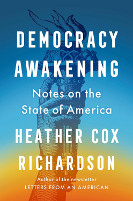
There is no denying the turbulence that American democracy has endured. Historian Heather Cox Richardson, in her conversation with Michelle Martin, discusses the deep-rooted challenges that the nation faces. She provides a compelling backdrop to decode today's unprecedented political scenarios.
Weaponizing Language and Distorting History
The power of language is immense, shaping perspectives and influencing entire societies. This power, primarily when used to manipulate, has deep roots that stretch far beyond our modern era. Through the ages, elites have realized the potential of words, often using them to distort historical facts. By doing so, they can sway public opinion and steer the trajectory of a nation. As Heather Cox Richardson points out, such distortions have played a pivotal role in pushing specific segments of America toward authoritarianism.
However, it's imperative to understand that this manipulation isn't just the everyday political spin we've become desensitized to. It represents a fundamental shift from the democratic principles upon which nations pride themselves. Such tactics take the idea of cooperative governance, a cornerstone of democracy, and paint it as a form of betrayal. In doing so, they jeopardize the foundational tenets of democratic societies, challenging the very essence of shared governance and collective progress.
Democracy's Constant Adversary
Like all other institutions, political entities undergo change and transformation over time. The Republican party, a longstanding pillar of American politics, is no exception. Richardson draws attention to its metamorphosis, highlighting how the party's evolution might be seen more as a regression in the eyes of some. Once a party deeply rooted in certain principles, it now appears to many as a faction with an alarming and revealing intent: a determination to upend a governmental structure that has remained broadly consistent since 1933.
This shift in the Republican party's ethos transcends the usual narratives of party politics or the expected tussles of bipartisanship. It represents something more profound and potentially more disruptive. At its heart, this change challenges the foundational principles upon which America was erected. The core values, ideals, and democratic structures that have defined the nation are now under scrutiny, revealing the potent influence of extremism and its capacity to reshape established political landscapes.
America's Vulnerability
The annals of world history are punctuated with episodes of rising authoritarian leaders and regimes. From ancient empires to modern-day dictatorships, the world has witnessed the emergence of figures who consolidate power and suppress dissent. Yet, in the present context, it's not just the rise but the allure of authoritarianism that is disconcerting. This allure often stems from a tantalizing narrative that paints a picture of a glorious past—when certain sections of society believed they enjoyed greater prominence and respect.
Richardson points out the danger of such nostalgic narratives. While returning to a perceived golden age might seem enticing, especially to those feeling sidelined in the current socio-political environment, it's essential to discern the mirage from reality. More often than not, the glorified past is an imagined construct that promises more than it can deliver. Those entrapped by its siren song might soon realize that such a vision, while comforting, seldom translates to tangible improvements in their real-world circumstances. It's a stark reminder of the need to critically evaluate the narratives we are presented with, and the promises they entail.
Reaching the Unreached
In an age where information flows abundantly and current events rapidly evolve, many are adrift in a sea of complexities and uncertainties. Richardson's book, Democracy Awakening, emerges as a grounding force amidst this tumult, offering clarity and insight. It meticulously charts America's path, starting from the transformative era of Franklin D. Roosevelt. This epoch brought sweeping changes to the current highly polarized and contentious political climate.
While the book provides an informative lens into America's past and present, its ambitions stretch further. Richardson doesn't just aim to inform or narrate a historical account. The deeper objective is to rekindle a sense of purpose and direction in its readers. By revisiting the nation's journey and understanding its evolution, the hope is that citizens will be inspired to re-embrace and uphold the foundational principles that have long served as the bedrock of American democracy.
Roots of America's Liberal Consensus
FDR's policies during the Depression era, followed by Eisenhower's commitment to civil rights, set the stage for what Richardson calls the "liberal consensus." It was an era where economic prosperity and social rights saw progress hand in hand. This era established a defense for democracy, a beacon that inspired many to uphold its tenets.
From the era of the founding fathers to today, the United States has oscillated between two opposing forces. One champions the idea that all are created equal, while the other believes in the inherent superiority of some. Richardson postulates that the allure of the latter arises during periods of instability, making society susceptible to its divisive rhetoric.
America's Moral Compass
Organizations like the NAACP have historically been at the forefront of holding the United States accountable to its ideals. Through consistent efforts, they have spotlighted the disparities in treatment before the law, thereby shaping the nation's conscience.
One of the antidotes to divisive rhetoric is ensuring a fairer economic distribution. Richardson emphasizes that economic prosperity and inclusivity have historically gone hand in hand. When economically secure, individuals are less susceptible to narratives that seek to divide.
Richardson's insights offer both a warning and a roadmap. America's democracy is threatened, and its defense requires a collective effort. Only by understanding our past, and the challenges it presents, can we navigate our way into a more inclusive and prosperous future.
Related Book: Democracy Awakening
Democracy Awakening: Notes on the State of America
by Heather Cox Richardson.
I n "Democracy Awakening," historian Heather Cox Richardson reaches deep into America's intricate past to decipher its present. Drawing from her immensely popular newsletter, Letters From An American, Richardson crafts a riveting narrative that sheds light on the erosion of American democratic ideals. With clarity and coherence, she reveals how a select group of elites have gradually distorted our nation's story, using language and false narratives to pave the way for authoritarianism.
n "Democracy Awakening," historian Heather Cox Richardson reaches deep into America's intricate past to decipher its present. Drawing from her immensely popular newsletter, Letters From An American, Richardson crafts a riveting narrative that sheds light on the erosion of American democratic ideals. With clarity and coherence, she reveals how a select group of elites have gradually distorted our nation's story, using language and false narratives to pave the way for authoritarianism.
Yet, amidst these cautionary tales, the book serves as both a beacon of hope and a clarion call, urging readers to recall the true principles of America's foundation. By intertwining events from the Founders to modern political figures, Richardson presents a historical panorama, offering not just a recount of the past five years but an insightful understanding of America's democratic journey, its challenges, and the way forward.
Click here for more info or to order this book.
About the Author
 Robert Jennings is co-publisher of InnerSelf.com with his wife Marie T Russell. He attended the University of Florida, Southern Technical Institute, and the University of Central Florida with studies in real estate, urban development, finance, architectural engineering, and elementary education. He was a member of the US Marine Corps and The US Army having commanded a field artillery battery in Germany. He worked in real estate finance, construction and development for 25 years before starting InnerSelf.com in 1996.
Robert Jennings is co-publisher of InnerSelf.com with his wife Marie T Russell. He attended the University of Florida, Southern Technical Institute, and the University of Central Florida with studies in real estate, urban development, finance, architectural engineering, and elementary education. He was a member of the US Marine Corps and The US Army having commanded a field artillery battery in Germany. He worked in real estate finance, construction and development for 25 years before starting InnerSelf.com in 1996.
InnerSelf is dedicated to sharing information that allows people to make educated and insightful choices in their personal life, for the good of the commons, and for the well-being of the planet. InnerSelf Magazine is in its 30+year of publication in either print (1984-1995) or online as InnerSelf.com. Please support our work.
Creative Commons 4.0
This article is licensed under a Creative Commons Attribution-Share Alike 4.0 License. Attribute the author Robert Jennings, InnerSelf.com. Link back to the article This article originally appeared on InnerSelf.com

Related Books:
On Tyranny: Twenty Lessons from the Twentieth Century
by Timothy Snyder
This book offers lessons from history for preserving and defending democracy, including the importance of institutions, the role of individual citizens, and the dangers of authoritarianism.
Click for more info or to order
Our Time Is Now: Power, Purpose, and the Fight for a Fair America
by Stacey Abrams
The author, a politician and activist, shares her vision for a more inclusive and just democracy and offers practical strategies for political engagement and voter mobilization.
Click for more info or to order
How Democracies Die
by Steven Levitsky and Daniel Ziblatt
This book examines the warning signs and causes of democratic breakdown, drawing on case studies from around the world to offer insights into how to safeguard democracy.
Click for more info or to order
The People, No: A Brief History of Anti-Populism
by Thomas Frank
The author offers a history of populist movements in the United States and critiques the "anti-populist" ideology that he argues has stifled democratic reform and progress.
Click for more info or to order
Democracy in One Book or Less: How It Works, Why It Doesn't, and Why Fixing It Is Easier Than You Think
by David Litt
This book offers an overview of democracy, including its strengths and weaknesses, and proposes reforms to make the system more responsive and accountable.



























